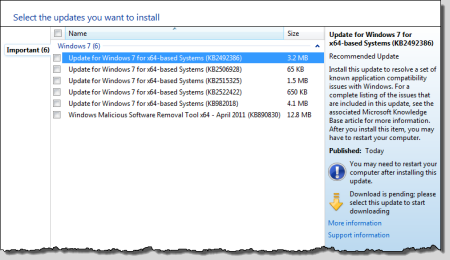The other Patch Tuesday brings crucial fixes for Windows

Every serious Windows user or admin knows Patch Tuesday. On the second Tuesday of every month, Microsoft releases its security updates and bulletins in a nice, predictable way.
And they do it again two weeks later.
I’ve written about the other Patch Tuesday before. In fact, it was almost exactly one year ago that Microsoft delivered a similar end-of-the-month batch of updates and I wrote It’s Patch Tuesday again.
But the fourth Tuesday of the month—that’s today—is the other Patch Tuesday, when additional updates, typically non-security-related, are released. (The "other Patch Tuesday" is documented in a Windows Help article, which says "Microsoft typically releases important updates on the second or fourth Tuesday of the month.")
Today is the fourth Tuesday in April, and right on schedule, five updates plus the Windows Malicious Software Removal Tool landed on Windows Update when I checked just a little while ago.

This month’s updates for Windows 7 include fixes for application compatibility, performance and reliability issues, and a couple of mysterious “issues in Windows.” All of the fixes are documented in Microsoft Support articles:
- 2492386: Application Compatibility Update for Windows XP, Windows Server 2003, Windows Vista, Windows Server 2008, Windows 7, and Windows Server 2008 R2: April 2011
- 2506928: A link in an .html file that you open in Outlook does not work in Windows 7 or in Windows Server 2008 R2
- 2515325: Windows Explorer may crash in Windows 7 or in Windows Server 2008 R2
- 2522422: Cannot print from Internet Explorer 9 using some Canon printers
- 982018: An update that improves the compatibility of Windows 7 and Windows Server 2008 R2 with Advanced Format Disks is available
Because these updates are rated Important, they should be installed overnight for anyone who has automatic updates enabled.
The third item in that list is almost completely devoid of helpful details. It simply reads:
Windows Explorer may crash on a computer that is running Windows 7 or Windows Server 2008 R2.
Note This issue usually occurs when you perform some operations that are related to the taskbar or to the Address bar.
Still, it sounds well worth installing, doesn't it?
That last one is especially important for anyone thinking of installing a new large hard drive. Here’s a snippet from this month’s Support article:
Hard disk drives have traditionally been based on 512 byte sectors, and all access to the physical media was addressed based on this unit. Recently, hard disks vendors have begun to transition to new disks that have a sector size of 4096 bytes (4 KB). These are generally known as an “Advanced Format Disk.” Because disks are only able to perform physical media updates in the granularity of the physical sector (4 KB in this case), a 512 byte write that is directed to the disk will require some additional work in order to be completed. This work comes at the cost of performance and reliability, with the specific cost varying based on the workload and hardware implementation. To avoid this additional work, applications must be updated to natively support writes that are based on the 4 KB sector granularity.
I haven’t spent any hands-on time with these new disks yet. But I heard an interesting presentation last month on the problems these so-called 4K disks can cause with file systems. This sounds like a big fix for Windows:
The Extensible Storage Engine API(ESENT) is a high-performance desktop database engine that is used by many applications, including Windows Update. Certain storage drivers have different kinds of support for querying the physical sector size of the hard disk in a hard disk drive and, when such a driver is upgraded, the reported physical sector size of the hard disk can change. Because of the logging structure of ESENT, applications that are built on ESENT receive an error message and stop responding when the reported physical sector size changes between operating system sessions.
Note Applications that are built on ESENT include Windows Update, Active Directory, Windows Desktop Search, certification authority (CA), WINS, DHCP, and Windows Live Mail.
That’s a pretty important list.
Are any of you using these disks yet, on any platform? Have you noticed any issues with them? Tell me about it in the Talkback section.